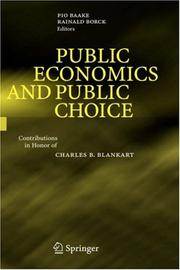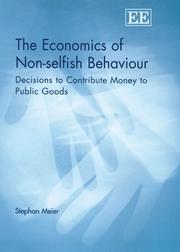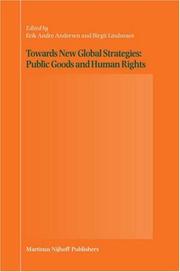| Listing 1 - 10 of 18 | << page >> |
Sort by
|
Book
ISBN: 9264201378 926420136X Year: 2013 Publisher: Paris : OECD Publishing,
Abstract | Keywords | Export | Availability | Bookmark
 Loading...
Loading...Choose an application
- Reference Manager
- EndNote
- RefWorks (Direct export to RefWorks)
La fourniture de biens publics agro-environnementaux par l’action collective passe en revue l’expérience de plusieurs pays Membres de l’OCDE dans le but d’analyser comment l’action collective peut être efficace pour promouvoir la fourniture de biens publics agroenvironnementaux, tels que la biodiversité et les paysages. L’étude porte sur vingt-cinq cas dans 13 pays (Australie, Belgique, Canada, Finlande, France, Allemagne, Italie, Japon, Pays-Bas, Nouvelle-Zélande, Espagne, Suède et Royaume-Uni). L’étude montre que l’action collective est une voie à envisager sérieusement pour traiter de nombreux problèmes liés à l’agriculture et aux ressources naturelles, et qu’elle devrait être expressément encouragée dans certaines situations.
Agriculture -- Environmental aspects. --- Public goods. --- Business & Economics --- Economic Theory --- Agriculture --- Environmental aspects. --- Goods, Public --- Environmental protection --- Finance, Public --- Welfare economics --- Free rider problem (Economics)
Book
Abstract | Keywords | Export | Availability | Bookmark
 Loading...
Loading...Choose an application
- Reference Manager
- EndNote
- RefWorks (Direct export to RefWorks)
This paper summarizes the estimates of what Russia will get from World Trade Organization accession and why. A key finding is the estimate that Russia will gain about USD 53 billion per year in the medium term from World Trade Organization accession and USD 177 billion per year in the long term, due largely to its own commitments to reform its own business services sectors. The paper summarizes the principal reform commitments that Russia has undertaken as part of its World Trade Organization accession negotiations, and compares them with those of other countries that have acceded to the World Trade Organization. It finds that the Russian commitments represent a liberal offer to the members of the World Trade Organization for admission, but they are typical of other transition countries that have acceded to the World Trade Organization. The authors discuss the outstanding issues in the Russian World Trade Organizaiton accession negotiations, and explain why Russian accession will result in the elimination of the Jackson-Vanik Amendment against Russia. They discuss Russian policies to attract foreign direct investment, including an assessment of the impact of the 2008 law on strategic sectors and the increased role of the state in the economy. Finally, the authors assess the importance of Russian accession to Russia and to the international trading community, and suggestions for most efficiently meeting the government's diversification objective.
Consumers --- Debt Markets --- Economic Theory & Research --- Economics --- Emerging Markets --- Exchange rates --- Finance and Financial Sector Development --- Free rider --- Free rider problem --- Free Trade --- GDP --- Growth rate --- Industrialization --- International Economics and Trade --- International trade --- Macroeconomics and Economic Growth --- Marginal benefits --- Open economies --- Open economy --- Political economy --- Private Sector Development --- Purchasing Power --- Telecommunications --- Trade disputes --- Trade liberalization --- Trade policy --- World Trade Organization --- WTO
Book
ISBN: 128303137X 9786613031372 140083810X 0691149798 0691156301 9781400838103 9780691149790 Year: 2011 Publisher: Princeton, N.J. Princeton University Press
Abstract | Keywords | Export | Availability | Bookmark
 Loading...
Loading...Choose an application
- Reference Manager
- EndNote
- RefWorks (Direct export to RefWorks)
All too often government lacks the skill, the will, and the wallet to meet its missions. Schools fall short of the mark while roads and bridges fall into disrepair. Health care costs too much and delivers too little. Budgets bleed red ink as the cost of services citizens want outstrips the taxes they are willing to pay. Collaborative Governance is the first book to offer solutions by demonstrating how government at every level can engage the private sector to overcome seemingly insurmountable problems and achieve public goals more effectively. John Donahue and Richard Zeckhauser show how the public sector can harness private expertise to bolster productivity, capture information, and augment resources. The authors explain how private engagement in public missions--rightly structured and skillfully managed--is not so much an alternative to government as the way smart government ought to operate. The key is to carefully and strategically grant discretion to private entities, whether for-profit or nonprofit, in ways that simultaneously motivate and empower them to create public value. Drawing on a host of real-world examples-including charter schools, job training, and the resurrection of New York's Central Park--they show how, when, and why collaboration works, and also under what circumstances it doesn't. Collaborative Governance reveals how the collaborative approach can be used to tap the resourcefulness and entrepreneurship of the private sector, and improvise fresh, flexible solutions to today's most pressing public challenges.
Public goods. --- Public-private sector cooperation --United States. --- Public-private sector cooperation --- Public goods --- Government - U.S. --- Law, Politics & Government --- Political Institutions & Public Administration - U.S., General --- Goods, Public --- Finance, Public --- Welfare economics --- Free rider problem (Economics) --- E-books --- Firms and enterprises
Book
ISBN: 0262029650 0262330830 9780262330831 9780262330824 0262330822 9780262029650 Year: 2015 Publisher: Cambridge, Massachusetts
Abstract | Keywords | Export | Availability | Bookmark
 Loading...
Loading...Choose an application
- Reference Manager
- EndNote
- RefWorks (Direct export to RefWorks)
The complexities of financing, installing, implementing, and regulating public infrastructures, including empirical research, analytical models, and theoretical insights.
Infrastructure (Economics) --- Public goods. --- Public works. --- Public works projects --- Buildings --- Construction projects --- Civil engineering --- Goods, Public --- Finance, Public --- Welfare economics --- Free rider problem (Economics) --- Capital, Social (Economics) --- Economic infrastructure --- Social capital (Economics) --- Social infrastructure --- Social overhead capital --- Economic development --- Human settlements --- Public goods --- Public works --- Capital --- Government policy. --- Government policy --- E-books --- ECONOMICS/Public Economics
Book
ISBN: 2226171002 9782226171009 Year: 2006 Volume: *4 Publisher: Paris: Albin Michel,
Abstract | Keywords | Export | Availability | Bookmark
 Loading...
Loading...Choose an application
- Reference Manager
- EndNote
- RefWorks (Direct export to RefWorks)
Public goods --- Globalization --- International economic relations --- AA / International- internationaal --- 351.7 --- 338.047 --- NBB congres --- Beheer van het openbaar domein. Openbare werken. --- Privé en openbare bedrijven. Openbare diensten. Gemengde economie. --- Conferences - Meetings --- Goods, Public --- Finance, Public --- Welfare economics --- Free rider problem (Economics) --- Privé en openbare bedrijven. Openbare diensten. Gemengde economie --- Beheer van het openbaar domein. Openbare werken --- Concurrence --- Économie publique --- Entreprises multinationale --- Intérêt général --- Mondialisation --- Public goods - Congresses. --- Globalization - Congresses. --- International economic relations - Congresses. --- Financement des missions --- Partenariat (ppp) --- Service public
Book
ISBN: 0521481023 Year: 1998 Publisher: Cambridge : Cambridge University Press,
Abstract | Keywords | Export | Availability | Bookmark
 Loading...
Loading...Choose an application
- Reference Manager
- EndNote
- RefWorks (Direct export to RefWorks)
Finance, Public --- Government competition --- Public goods --- Finances publiques --- Concurrence de l'Etat --- Biens collectifs --- finances publiques theorie --- gouvernement --- concurrence --- biens collectifs --- theories economiques --- AA / International- internationaal --- 320.0 --- 321.4 --- 321.2 --- 330.580 --- openbare financien theorie --- regering --- concurrentie --- collectieve goederen --- economische theorieen --- Algemene werken en handboeken over politiek. --- Democratie. --- Economisch beleid van de overheid. --- Gecontroleerde economie. Geleide economie. Welvaarststaat. Algemeenheden. --- Goods, Public --- Welfare economics --- Free rider problem (Economics) --- Competition --- Cameralistics --- Public finance --- Currency question --- Algemene werken en handboeken over politiek --- Economisch beleid van de overheid --- Democratie --- Gecontroleerde economie. Geleide economie. Welvaarststaat. Algemeenheden --- Public finances --- Finance, Public. --- Finances publiques. --- Public goods. --- Biens collectifs. --- Government competition. --- Concurrence --- Politique publique.

ISBN: 9783540727811 3540727817 9783540727828 3642091873 9786610944477 1280944471 3540727825 Year: 2007 Publisher: Berlin: Springer,
Abstract | Keywords | Export | Availability | Bookmark
 Loading...
Loading...Choose an application
- Reference Manager
- EndNote
- RefWorks (Direct export to RefWorks)
This volume collects essays in honor of Charles Beat Blankart on the oc- th sion of his 65 birthday. Blankart's research is mainly in the area of public finance and public choice. He is also known for his interest in real world problems and intellectual curiosity. These features seem to be well c- veyed by the contributions. Born in Switzerland, Blankart completed his Ph. D. in Basel before moving to Germany. The typically Swiss perspective on individual freedom, h- ever, has remained with him. Blankart has taught at the Free University of Berlin, the University of the Federal Armed Forces in Munich, Technical University and Humboldt University in Berlin. Throughout his prof- sional positions, Blankart has contributed to various fields, including p- lic finance, public choice, federalism and industrial organization and re- lation. He has left significant marks in these fields, emphasizing throughout how incentives shape the behaviour of individuals, be it in markets or in government. For example, his best selling textbook - fentliche Finanzen in der Demokratie, is unique in bringing a unified p- spective to the study of public finance, treating politicians as ordinary self interested individuals and doing largely away with the benevolent welfare maximizing social planner.
Social choice. --- Finance, Public. --- Public goods. --- Choix collectif --- Finances publiques --- Biens collectifs --- Social choice --- Finance, Public --- Public goods --- Blankart, Charles Beat --- Economics. --- Finance. --- AA / International- internationaal --- 336.00 --- 336.001 --- Goods, Public --- Welfare economics --- Cameralistics --- Public finance --- Currency question --- Choice, Social --- Collective choice --- Public choice --- Choice (Psychology) --- Social psychology --- Organisatie van de overheidsfinanciën. Overheidsuitgaven en -inkomsten: algemeenheden. --- Free rider problem (Economics) --- Economic theory. --- Public finance. --- Public Economics. --- Economic Theory/Quantitative Economics/Mathematical Methods. --- Organisatie van de overheidsfinanciën. Overheidsuitgaven en -inkomsten: algemeenheden --- Economic theory --- Political economy --- Social sciences --- Economic man --- Public finances

ISBN: 1845424417 9781845424411 Year: 2006 Publisher: Cheltenham: Elgar,
Abstract | Keywords | Export | Availability | Bookmark
 Loading...
Loading...Choose an application
- Reference Manager
- EndNote
- RefWorks (Direct export to RefWorks)
Altruism --- Helping behavior --- Public goods --- Charity --- Economic aspects --- AA / International- internationaal --- 361 --- 201 --- Openbare onderstand en weldadigheid. Menslievendheid. Sociaal hulpbetoon. --- Sociologie: algemeenheden. --- #SBIB:17H25 --- Sociale wijsbegeerte: economische orde en arbeid --- Altruïsme --- Economie: ethische en morele aspecten --- Altruïsme. --- Economie: ethische en morele aspecten. --- Altruistic behavior --- Unselfishness --- Conduct of life --- Goods, Public --- Finance, Public --- Welfare economics --- Free rider problem (Economics) --- Behavior, Helping --- Human behavior --- Interpersonal relations --- Caring --- Alms and almsgiving --- Sociologie: algemeenheden --- Openbare onderstand en weldadigheid. Menslievendheid. Sociaal hulpbetoon --- Altruism - Economic aspects --- Helping behavior - Economic aspects

ISBN: 9004155074 9786611917395 1281917397 9047421299 9789047421290 9789004155077 9781281917393 661191739X Year: 2007 Publisher: Leiden: Nijhoff,
Abstract | Keywords | Export | Availability | Bookmark
 Loading...
Loading...Choose an application
- Reference Manager
- EndNote
- RefWorks (Direct export to RefWorks)
This book aims to contribute to the debate on global public goods, a debate which has been taking place for some time in the UN and the World Bank, among the regional development banks and bilaterally among states and donors. There is a need for new visions and strategies and to examine global infrastructure on the basis of the idea that global public goods, including human rights, contribute to cohesion at local, regional and international levels. The book investigates the possibilities and disadvantages of applying the idea of public goods in a global context. It explains the history of the concept and its significance for human rights. The authors include, in addition to academics, representatives from public institutions, civil society organizations, independent consultants, the media and the private sector.
Economics -- Political aspects. --- Globalization -- Social aspects. --- Human rights. --- Public goods. --- Social justice. --- Public goods --- Human rights --- Globalization --- Social justice --- Economics --- Economic Theory --- Business & Economics --- Social aspects --- Political aspects --- Social aspects. --- Political aspects. --- Economic theory --- Political economy --- Basic rights --- Civil rights (International law) --- Rights, Human --- Rights of man --- Goods, Public --- Law and legislation --- Social sciences --- Economic man --- Equality --- Justice --- Human security --- Transitional justice --- Truth commissions --- Finance, Public --- Welfare economics --- Free rider problem (Economics) --- E-books --- Collectieve goederen. --- Internationalisatie. --- Mensenrechten. --- Ontwikkelingspolitiek. --- Biens collectifs. --- Droits de l'homme (Droit international) --- Justice sociale. --- Mondialisation --- Économie politique et politique. --- Aspect social. --- Globalization - Social aspects. --- Economics - Political aspects.

ISBN: 0521477182 0521471486 1139174312 9780521471480 9780521477185 Year: 1996 Publisher: Cambridge: Cambridge university press,
Abstract | Keywords | Export | Availability | Bookmark
 Loading...
Loading...Choose an application
- Reference Manager
- EndNote
- RefWorks (Direct export to RefWorks)
This book presents a theoretical treatment of externalities (i.e. uncompensated interdependencies), public goods, and club goods. The new edition updates and expands the discussion of externalities and their implications, coverage of asymmetric information, underlying game-theoretic formulations, and intuitive and graphical presentations. Aimed at well-prepared undergraduates and graduate students making a serious foray into this branch of economics, the analysis should also interest professional economists wishing to survey recent advances in the field. No other single source for the range of materials explored is currently available. Topics investigated include Nash equilibrium, Lindahl equilibria, club theory, preference-revelation mechanism, Pigouvian taxes, the commons, Coase Theorem, and static and repeated games. The authors use mathematical techniques only as much as necessary to pursue the economic argument. They develop key principles of public economics that are useful for subfields such as public choice, labor economics, economic growth, international economics, environmental and natural resource economics, and industrial organization.
336.1 --- 330.1 --- Externalities (Economics) --- Public goods --- Goods, Public --- Finance, Public --- Welfare economics --- Free rider problem (Economics) --- Costs, Social --- External economies and diseconomies --- External effects (Economics) --- Social costs --- Economics --- Waste (Economics) --- 330.1 Economische grondbegrippen. Algemene begrippen in de economie --- Economische grondbegrippen. Algemene begrippen in de economie --- 336.1 Public finance, government finance in general --- Public finance, government finance in general --- 305.6 --- 330.00 --- 330.52 --- AA / International- internationaal --- Risicotheorie, speltheorie. Risicokapitaal. Beslissingsmodellen --- Economische en sociale theorieën: algemeenheden --- Liberaal systeem. Neo-liberalisme. Theorie van de onderhandeling --- Public goods. --- Business, Economy and Management
| Listing 1 - 10 of 18 | << page >> |
Sort by
|

 Search
Search Feedback
Feedback About UniCat
About UniCat  Help
Help News
News